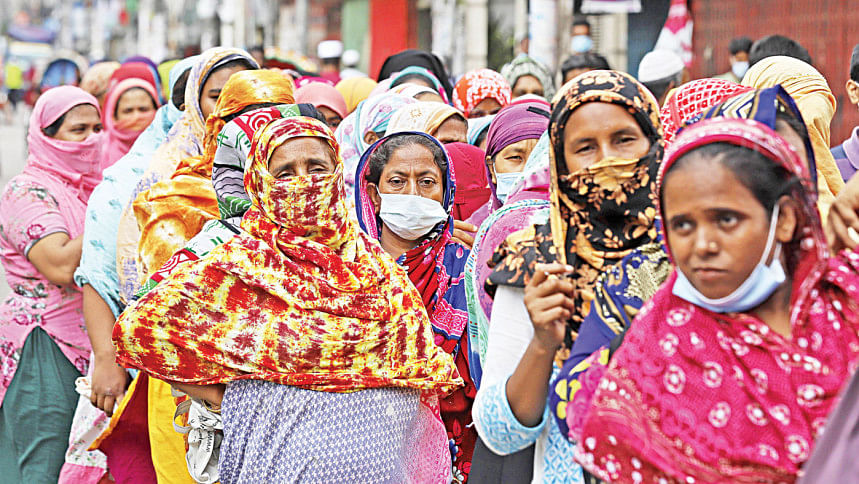Never called back to work

A few weeks ago, the photo of 65-year-old Asiya Begum -- a house-help who was walking for two hours, wading through ankle-deep water, to reach her home at Hemayetpur from her employer's house at the capital's Lalmatia -- went viral on social media.
Since the first day of the lockdown, Asiya had been walking around 32 kilometres daily, going to her workplace and returning, in absence of public transport.
The photo drew attention of people of all social classes, and thousands of comments condemned the inhumane attitude of the employer, who forced her to work amid the lockdown.
Despite the conditions, according to Prothom Alo Staff Photojournalist Dipu Malakar, who took the picture, Asiya considered herself lucky to be working, even amid rain and lack of transport, especially at a time when almost all domestic workers in her neighbourhood became jobless in the pandemic.
"Asiya walks for more than four hours every day to get Tk 5,000 per month from her job. She uses that money to treat her only son, who has cancer," he said.
"According to her, if she loses this job, she will have to starve with her son," Dipu added.
Asiya's fear is real, as according to National Domestic Women Workers Union (NDWWU), an overwhelming majority of the capital's domestic workers lost their jobs in the pandemic. Employers did not allow house-helps to enter homes, considering them to be potential coronavirus carriers, as most live in packed low-income settlements.
According to the union, many are yet to manage jobs, and in absence of any government support, they have been leading a miserable life amid financial worries and debts.
For example, 33-year-old Jaheda Begum, a resident of Mirpur's Wapda slum, used to work at three houses in Mirpur Cantonment, from which she would earn Tk 9,000 per month.
Last year, when the countrywide lockdown began, Jaheda was told not to come to work and was promised to be reappointed, once the situation gets better.
After receiving a month's salary, she was never called back.
"It was a nightmare for me. I was shocked and didn't know what to do. Later, when the situation got better, I managed a job at Mirpur DOHS, which paid Tk 2,000. But when my daughter gave birth, I couldn't join work for only two days, and they replaced me with someone else," she said.
Speaking about the stigma she would regularly face, Jaheda said, "I was always treated as a virus carrier, even when I brought a fresh set of clothes to wear, disinfected myself after entering the house and maintained social distancing."
Now, Jaheda along with her 12-year-old son is financially dependent on her rickshaw-puller husband, whose income has also dried up during the movement restrictions.
According to NDWWU Coordinator Abul Hossain, Bangladesh has approximately 30 lakh domestic workers. Of them, 40 percent live at the employer's house, while the others do their work and go back home.
"If we assume at least 10 percent of them are yet to manage jobs that pay on average Tk 5,000, it means they have been losing total wages amounting to Tk 150 crores per month," he explained.
"The government is concerned about migrant workers who earn foreign currency. But we demand the plight of domestic workers, who are internal migrant workers and contribute to the informal economy, be considered too," he said.
"About testing and vaccines, none of them know the formal procedures for these services. Even though these workers are part of our everyday life, they are yet to be put on the vaccine priority list. I think they will be the least prioritised people," he added.
Mentioning the lack of cash and food assistance from the government, Abul said the union provided food for 1,000 domestic workers in Dhaka, using foreign donations.
Meanwhile, violence against domestic workers went up in the pandemic.
According to data from human-rights organisation Ain O Salish Kendra, 18 house-helps were tortured from January to May this year. Of them, eight have died.
NDWWU General Secretary Murshida Akter said due to the economic downturn and loss of income, the rate of violence has increased in the domestic sphere, which resulted in increased incidents of violence against child domestic workers.
"For example, 12-year-old Sweety, who was employed at a house in Segunbagicha, wasn't provided with sufficient food and was tortured over trivial matters for the past nine months," she said.
"In the last incident, the employer tortured her for three days in a row and didn't give her food, after she ate a biscuit without asking. She was able to escape with the help of a neighbour, who called 999," she added.
Bangladesh National Women Lawyers' Association President Advocate Salma Ali said the recent incidents of violence against such workers in Bhatara and Segunbagicha has created great concern for their protection.
"The Domestic Workers Protection and Welfare Policy, 2015" has specific provisions to ensure physical and mental welfare of house-helps, good behaviour of employers, regular payment of wages and alimony, as well as granting sufficient vacations. But in reality, in absence of proper implementation of a law, these are not being followed, she said.
Salma urged the government to take necessary action to formulate laws and demanded exemplary punishment for perpetrators.

 For all latest news, follow The Daily Star's Google News channel.
For all latest news, follow The Daily Star's Google News channel. 


Comments